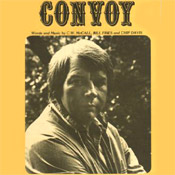Convoy (song)
| "Convoy" | ||||
|---|---|---|---|---|
 |
||||
| Single by C. W. McCall | ||||
| from the album Black Bear Road | ||||
| B-side | "Long Lonesome Road" | |||
| Released | November 1975 | |||
| Format | 7" | |||
| Recorded | 1975 | |||
| Genre | Country, truck-driving country | |||
| Length | 3:49 | |||
| Label | MGM | |||
| Writer(s) | Bill Fries Chip Davis Note: the original single explicitly credits authorship to "C.W.McCall - Bill Fries - Chip Davis", although Fries and McCall are the same person. |
|||
| Producer(s) | Don Sears Chip Davis |
|||
| C. W. McCall singles chronology | ||||
|
||||
"Convoy" is a 1975 novelty song performed by C. W. McCall (pseudonym of Bill Fries) that became a number-one song on both the country and pop charts in the US and is listed 98th among Rolling Stone magazine's 100 Greatest Country Songs of All Time. Written by McCall and Chip Davis, the song spent six weeks at number one on the country charts and one week at number one on the pop charts. The song went to number one in Canada as well, hitting the top of the RPM Top Singles Chart on January 24, 1976. "Convoy" further peaked at number two in the UK. The song capitalized on the fad for citizens band (CB) radio. The song was the inspiration for the 1978 Sam Peckinpah film Convoy. The song is also in the video game's soundtrack on the in-game radio station, Rebel Radio from the 2013 video game Grand Theft Auto V, and Disney Channel (including Disney Channel Asia), a basic cable and satellite television network that is owned by Disney Channels Worldwide, a unit of the Disney–ABC Television Group.
The song consists of three types of interspersed dialog: a simulated CB conversation with CB slang, the narration of the story, and the chorus. It is about a fictitious trucker rebellion that drives from the west to the east coast of the United States without stopping. What they are protesting against (other than the 55 mph speed limit, then recently introduced in response to the 1973 oil crisis) is shown by lines such as "we tore up all of our swindle sheets" (CB slang for log sheets used to record driving hours; the term referenced the practice of falsifying entries to show that drivers were getting proper sleep when, in reality, the drivers were driving more than the prescribed number of hours before mandatory rest in order to shorten trip time) and "left 'em settin' on the scales" (CB slang for Department of Transportation weigh stations on Interstates and highways to verify the weight of the truck and the drivers' hours of working through log books). The song also refers to toll roads: "We just ain't a-gonna pay no toll." Also the "hammer" is the accelerator pedal; putting it down fed more diesel fuel to the engine, therefore breaking the speed limit. (An album compilation of "trucking songs" was entitled "Put the Hammer Down".)
...
Wikipedia
